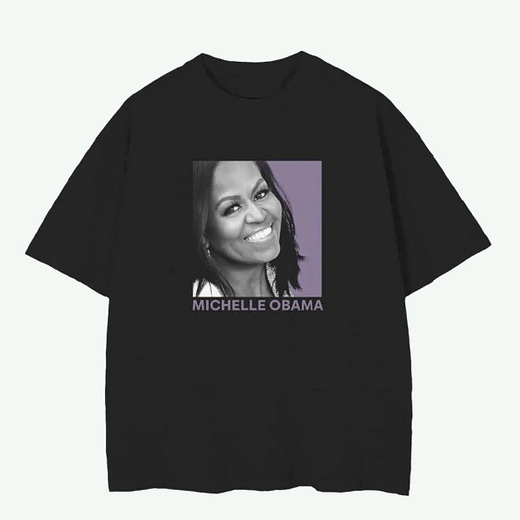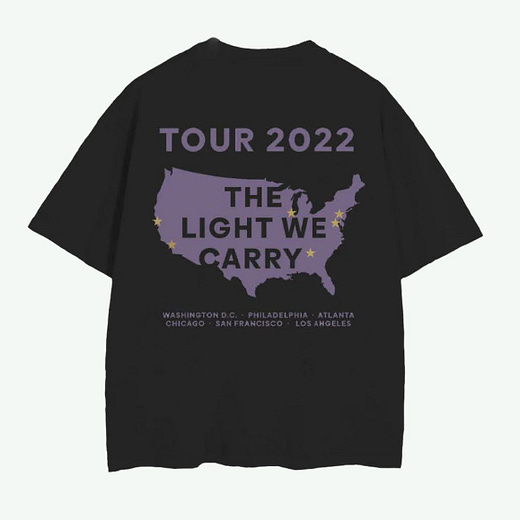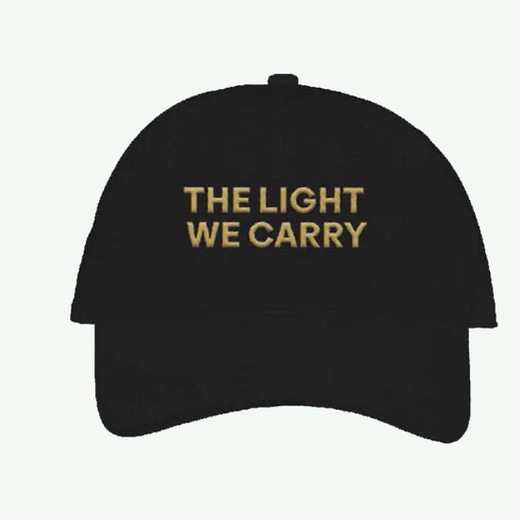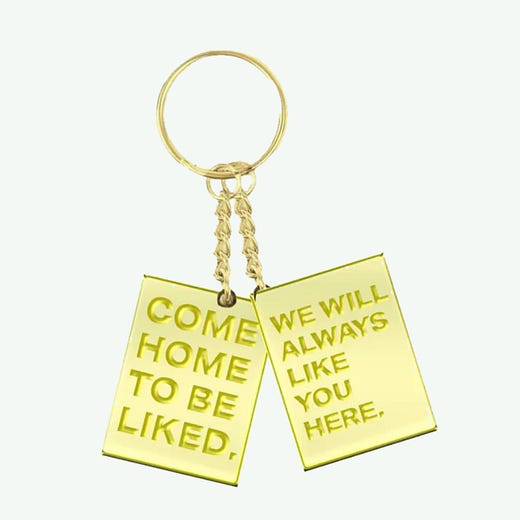🎧 Why I look at ads differently now
Plus: Michelle Obama is selling The Light We Carry Tour merch
Hello, in this issue we’ll look at the ways research suggests our political worldview informs our decisions as consumers. Scroll to the end to see Michelle Obama’s tour merch. — Hunter
🎧 Hey guys, it's Hunter. This is voice notes, this is just whenever I do a story and there's a lot that's left on the cutting room floor or a lot of extra research and interviews I have that didn't make it into the final story, I like to offer my readers, just I whip out my phone, record a voice note about some of the stuff. It's just a chance to go deeper into the story, a little bit behind the scenes. I offer this to my paid subscribers. I'm making this one available to everyone. If you're interested in more deeper dives like this into exclusive stories and supporting my work, consider upgrading your subscription and you'll get access to this and other stories.
This week I wanted to talk about a story I wrote a few weeks ago about how different marketing messages work for Democratic versus Republican consumers. I wrote this story for my paid subscribers. When we talk about brands and politics we’re usually talking about brands that take public stances on political or social issues or a lot of times it's really culture wars-based, people calling a brand ~w0kE~ without being able to define what woke means, you know, it's very much loud, it's very much out there, we’re talking about M&Ms, we're talking about brands’ decisions to do things that people see as as political signaling. And the thing is there is a lot of truth to the way brands break down by party, you know conservatives are more likely to drink Coke and wear Wranglers and liberals are more like Pepsi and wear Levi's, but I think it actually goes a lot deeper and a lot of what we see when it comes to branding and politics is actually pretty subtle.
This story I wrote just looked at how brands, how we as consumers use them to differentiate ourselves and one of two ways that brands are able to fill this role is differentiating, it's called vertical differentiation, which is really about status signaling, which is about hierarchy, like you have a product to show that it is better, versus horizontal differentiation, which is about showing your uniqueness, it's not about showing you're better than someone it's about showing that you're different. When it comes to differentiation, a lot comes down to is it better or is it different. Republicans prefer vertical differentiation, they prefer those status-signaling brands because they view it as a sign of how hard they work to get to a position and that's really what that brand represents to them, versus liberals prefer horizontal differentiation because they don't adhere to that same worldview. They don't see the social hierarchy similarly, so they are looking for different things with their brands. It really comes down to this idea of social hierarchy and privilege and you know, what do you believe about that? What are you looking to signal with that?
And the study looked at a couple different ways to quantify that. They found conservatives were more likely to pick the chance to win a gift card to Ralph Lauren, kind of this status-seeking brand versus liberals who prefer Urban Outfitters, which you know, obviously a younger clientele there, which might have something to do with it, but also it's just a brand, it's not about fitting into the mold, finding clothes that signal your personality and what makes you unique. They also found that there were terms on Google search that were more prominent and Republican-leading states versus Democratic-leaning ones. In Republican states they’re more likely search for terms like “elite,” “luxury,” “prestige,” “success,” and then Democratic states are more likely to search for terms like “anti-establishment” and “counterculture” and “unconventional.”
So since doing that story, I've been watching ads lately just kind of trying to see if I see examples of this and I saw an ad that I thought was signaling to both Democrats and Republicans and it was from Krogers, which operates Krogers grocery store, Fry’s, Smith's, and in the ad, maybe you've seen it, they talk about a 27-point inspection they have on produce for things like color and scarring. So I see that and I'm thinking oh, this is really about status, like, they're trying to say hey our produce is the best produce you should come shop here if you want to have high-quality produce that meets all of these things, but then it ends with the tagline “Fresh for Everyone,” which is very much anti-status seeking. They have this whole ad talking about how great their produce is and then it ends with and it's available to everyone, like, they're not trying to gatekeep this incredible, beautiful, aesthetically pleasing produce. So I really I thought this was kind of an aha moment like I found an example and what a great example, right, Democrats and Republicans both need groceries. Like if there is a if there is a category that you really want to reach people regardless of party grocery stores seems like a good one.
But then I was doing a little more reading and I found out that I was wrong. So Nailya Ordabayeva, who’s the Dartmouth associate professor who did one of the studies I wrote about, she did more research where she looked at 117 shoppers at a farmer's market and she found that conservatives were more likely to buy inferior produce. So completely blew my theory about that grocery store out of the water and you know produce is obviously different from apparel. There's different factors that play when you're choosing Ralph Lauren versus Urban Outfitters, then when you are buying yams, right? Those status seeking motives are dormant, but kind of like with those consumer brands, the researchers in the study really look to things that are fundamental to people's worldview that influences their politics and found and theorize why that plays a role in their purchasing. And when it comes to this produce with conservatives preferring stuff that looks inferior, they attribute to it this idea of balance or that the belief that negatives are offset by positives and it's basically this idea it kind of goes back to this idea of status quo, that conservatives are more likely to want to preserve the status quo. And so this idea of balance is that you know, if all options contain good and bad, then there's no need to challenge the status quo, there's no justification to move away from that because you can see a product that has inferior qualities, but you believe that it must also have good qualities too. You see a produce item that looks aesthetically inferior and you think it might actually taste better.
It also plays out in customer complaints. Another study found conservatives are less likely to file customer complaints than liberals, which they attributed to more conservatives believing in free will, which increases their trust in their own decisions, that they're free to make their own decisions and their decisions are the right ones. And so they asked people from our purchase they made. It had to be in the past two years. It had to be $30 at least. And yeah, they found conservatives had a higher level of customer satisfaction.
And so, you know we talk about when we talk about business and marketing and politics, there's all this obvious stuff on the surface, but there's so much more going on beneath the surface and subtle ways that people can communicate to consumers based on their political beliefs and all these researchers really go into like what this means for marketers. This produce study, they look at companies like Imperfect Produce or Hungry Harvest that they might want to invest a little more advertising in Texas than they do in California. If you sell produce that doesn't have that doesn't pass this 27-point inspection, you're going to want to reach consumers who are more liked likely to to be interested in that and politics can be a great predictor of that.
With luxury products, the way Democrats versus Republicans respond to luxury marketing is very different and in the study on different kinds of marketing messages to consumers, they found that Republicans prefer messages that are about status maintenance versus Democrats who see luxury products as status advancement, and the idea is if you're in uncertain economic times like we are today, these luxury brands can appeal to conservative consumers by activating that status-maintenance impulse, like, buy our product and you will maintain your status in the hierarchy. So I think whatever happens with all this economic news, there's a lot of uncertainty, I think it will be interesting to see do we see brands change their marketing to adapt that and do they change based on reaching people by politics?
There's a recent Vogue story about how luxury brands are adapting to a new era of marketing because obviously luxury products you need to have, it is about status, you want to be loud, but they're trying to be loud and quiet at the same time was kind of the point of this article. And so instead of big prominent logos, it's about building a visual brand that communicates your brand more subtly. So things like color, they pointed to Tiffany with its robin's egg blue and how that color showed up in their Nike shoes and it's like all you need to do is see that color and you know, oh, that's Tiffany. And so there was this design company founder and he said that there's just a growing interest in non-graphic motifs and house codes that are identifying garments and brands without the need for the logo to be plastered all over it. That status seeking imperative for these brands hasn't gone away, but you need to be a little more sophisticated about that.
Anyway, I think a lot of this research it really opens your mind to what is it about our core worldview that makes us believe certain things about politics and how does that show up in other aspects of our lives? And I think the things that I would really like to see more of is examples where you know, these studies find things where Republicans are more likely to do this, Democrats are more likely to like that, etc., etc., and I'm really interested in the people who kind of break those boundaries, like are there consumer choices and brands that break the mold, you know, are there examples of liberals who prefer inferior products because either he brand makes appeals to uniqueness or it makes appeals to underdog status or sustainability, maybe something more politically overt. Are there examples of brands that say one thing publicly that leads you to believe they have a certain politics and then their marketing is just completely the opposite? I mean, these are kind of things that I've always keeping my eye out for. I'd be interested if you guys have seen any ads recently that you think tap into any of these concepts or just anything you've seen with how political ideology affects consumption. Anyways, yeah an interesting topic keep your eye out when you're looking for ads and thank you guys so much for reading. If you'd like to read more about politics, marketing, art, and design, be sure to subscribe to my newsletter and I'll talk to you guys later. Bye.
Have you seen this?
Future NASA moonwalkers to sport sleeker spacesuits. Axiom Space said it’s designing spacesuits for future moonwalking NASA astronauts that will be more flexible and protective. [Associated Press]
Michelle Obama is selling The Light We Carry Tour merch. Her online shop includes $45 tees and hats and a $100 crewneck.
JR’s gigantic new installation in Hong Kong has worried the city’s feng shui masters. Feng shui practitioners say JR's new work is a bad omen — they felt the same way about Kaws's Companion. [Artnet News]
🔒 How countries protect their brands. Marketing laws are a nation-state equivalent of fighting against trademark dilution, and in protecting their national brands, the U.S. and other countries are proving just how valuable their products and industries really are. [𝘠𝘌𝘓𝘓𝘖]








